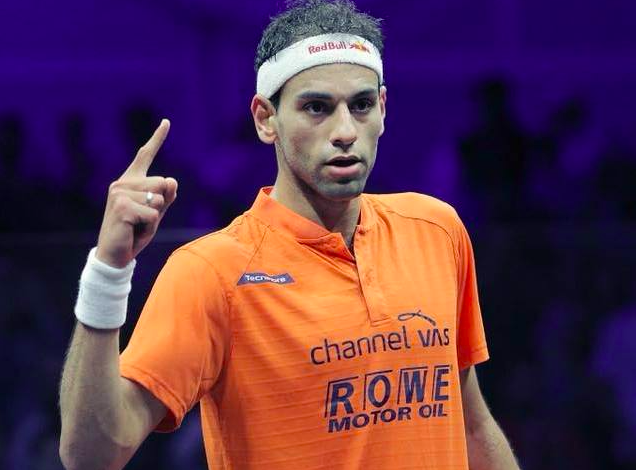
Egyptian squash star Mohamed al-Shorbagy has chosen to represent England instead of Egypt in interpretation tournaments, shocking the Egyptian Squash Federation as Shorbagy ranked third in the world in the game that Egypt has been monopolizing globally for both men and women categories.
The Egyptian player took the sudden decision four days after he lost the semi-finals of the El Gouna International 2022, leaving speculation over the reasons behind the shocking move.
New Zealand player Paul Coll, ranked second in the world, qualified for the final of the El Gouna International after defeating Shorbagy by three sets to two.
Shorbagy objected to the match referee’s decision, which prompted her to give his competitor a point at his expense.
Another point was granted to Coll because Shorbagy was delayed in playing due to the objection, so the match ended in favor of Coll.
Did Shorbagy feel that he was not supported being an Egyptian player, even though he was playing the tournament in Egypt?
Or was the decision to play for the UK private and decided some time ago?
Shorbagy expressed great enthusiasm to play in the name of England, after the England Squash association officially announced that he would compete in the upcoming international tournaments as an English player.
Shorbagy commented saying: “I’m really excited to be representing England now.”
“I’ve lived in England more than half my life and have been trained by British coaches since the age of 15.
“I came to study in England in 2006 and Bristol has since become my home. As a British Citizen now, I will give everything I can to a country that has supported me for so many years.
“National Coach David Campion and the wider England Squash team have offered me a lot of support over the years. When you have people like that who appreciate you for who you are, without expecting anything back it means a lot.
“The opportunity to represent England is extremely exciting and I will give it my all playing under the English flag.”
“My goal is to compete and return to win titles and top the world rankings. I will even be an assistant to the young generations in England,” he said.
Shorbagy won 44 international tournaments out of 71 that he played becoming the Egyptian player who achieved the largest number of titles in squash.
Shorbagy won the world title once in 2017, while he was runner-up three times.
Shorbagy is the fifth most ranked player in the world rankings for the game with a score of 50 months, as well as the Egyptian player who maintained the top of the rankings for the longest period.
Egyptian players dominate the squash game internationally with seven out of the ten best players in the men’s category according to the PSA World rankings, and five out of the ten best female players being Egyptian. The top three female squash players are Egyptian.
The top four in the world rankings are Egyptians, and there are five others among the top 20 globally.
According to the New York Times newspaper, since 2003, an Egyptian player has won the men’s world championship ten times.
Egyptian players dominate the game due to their high competitiveness, the NYT explained.
It added Cairo, with only 400 stadiums and less than 10,000 players, was able to create its champions and to create a cohesive society for the game, where the emerging talents play against each other and are directed by the best coaches in the world.
“These young players get to see how the greats play, train, eat,” Daniel Coyle, the author of “Culture Code: The Secrets of Highly Successful Groups” book told the US paper.
The second feature of the Egyptian players is their dynamic tactic that was able to transfer the game to a faster world instead of the slower classic squash. Former world champion Raneem al-Welily says that she and her colleagues play squash like they drive a car.
“Egyptian squash is dynamic and unstructured, with out-of-nowhere drop shots and deceptive flicks of the wrist,” the New York Times said.
“The old style of game was about the long attritional rallies, hundreds of shots, up and down the side wall, but now largely thanks to the Egyptians you’re seeing a new style of squash: attacking squash,” Alan Thatcher, editor and publisher of the website Squash Mad, told France24.




